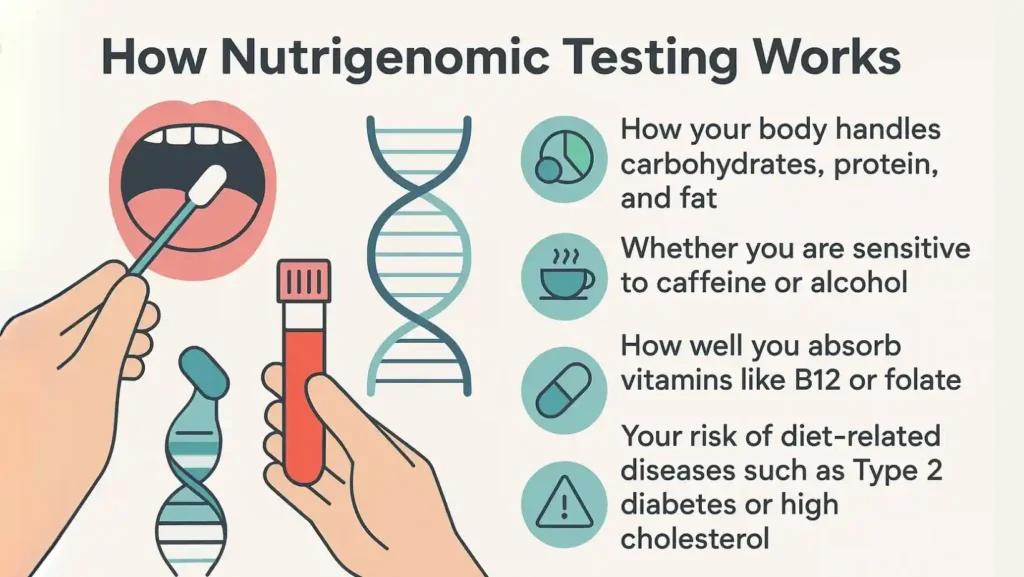Nutrigenomics is changing how we look at food and health. Instead of one-size-fits-all diet rules, science now shows your DNA may decide how food affects your body. This means what keeps one person healthy may not work for another. With the rise of genetic testing, researchers believe that eating based on your genes could lower disease risks, improve energy, and even help with weight management.
What Is Nutrigenomics?
Nutrigenomics is the study of how food interacts with your genes. Your DNA carries instructions for how your body works, but food has the power to switch certain genes on or off. This process is called gene expression.
Scientists believe these food-gene interactions explain why two people can eat the same meal and have very different reactions. For example, one person’s blood sugar (glucose) may rise quickly after bread, while another stays stable. That is because of genetic variations that control digestion, metabolism and genetics, and hormone response.
Some key roles of nutrigenomics include:
- Understanding how certain foods affect genes (genetic variants) linked to disease.
- Finding how diet influences lipids / blood lipids, cholesterol, and triglycerides.
- Learning how nutrients like protein, fat, and carbohydrates affect your health differently based on your DNA.
Nutrigenomics And Personalized Nutrition
One of the strongest applications is nutrigenomics and personalized nutrition. Instead of following the latest diet trend, you can build a personalized diet plan based on your DNA.
For instance:
- If you have a gene that slows down caffeine breakdown, too much coffee could raise your high blood pressure (hypertension) risk.
- If your genes show poor fat metabolism, eating fewer fried foods could lower your cholesterol.
- If your body responds well to omega-3 fatty acids, adding fish or flaxseeds could protect your heart.
This type of precision nutrition takes your genetics into account and builds a plan that works for your body, not just general advice. Working with a registered dietitian who understands nutrigenomics ensures the plan is safe and backed by science.
Nutrigenomics And Weight Loss
Another growing area is nutrigenomics and weight loss. Some people lose weight easily on low-carb diets, while others do better with more carbs. Genes can explain these differences.
One example is the FTO gene, often called the “fat gene.” People with certain FTO variants are more likely to struggle with obesity. But studies show they can still achieve weight management or weight loss with the right diet and exercise.
Your genes may also affect:
- How strongly you feel sweet cravings.
- How efficiently your body burns calories.
- How metabolism / energy balance changes after meals.
This means weight loss is not only about willpower. DNA can influence how food choices and exercise affect results.
How Does Nutrigenomic Testing Work?

Nutrigenomics testing is done through a simple saliva swab or blood sample. Labs study the DNA and look for genetic variants linked to nutrition.
The results may include:
- How your body handles carbohydrates, protein, and fat.
- Whether you are sensitive to caffeine or alcohol.
- How well you absorb vitamins like B12 or folate.
- Your risk of diet-related diseases such as Type 2 diabetes or high cholesterol.
Test Accuracy In Nutrigenomics Testing
While genetic testing for nutrition looks exciting, accuracy remains a challenge. Many labs can identify genes, but linking them to food recommendations is complex. Some studies are still in progress, and the results do not always match real-world outcomes.
This is why experts recommend using these tests as a guide rather than a strict rulebook. Always combine results with lifestyle habits and advice from health professionals.
Over-The-Counter Nutrigenomics Testing Kits
Today, many companies sell DNA testing or genetic testing kits online. These kits claim to reveal your ideal diet and exercise plan. While they are easy to use, they often simplify results.
For example, a kit may say you are lactose intolerant or have a higher risk of gaining weight with high-fat diets. But the science behind some claims may not be strong. The best approach is to use these results along with advice from a registered dietitian who understands nutrigenomics or nutritional genomics.
How Can Nutrigenomics Impact Your Diet?
The idea of a nutrigenomics diet and food choices is powerful. Instead of guessing which foods work for you, DNA testing may provide direct answers.
Here is a table showing how specific genes can affect diet choices:
| Gene/Factor | Effect on Body | Possible Diet Adjustments |
| FTO gene | Linked to obesity risk | Focus on portion control, balanced macros |
| CYP1A2 gene | Controls caffeine metabolism | Limit coffee if you are a slow metabolizer |
| LCT gene | Lactose digestion | Reduce dairy if intolerant |
| APOA2 gene | Fat processing | Lower saturated fat intake |
| TCF7L2 gene | Risk of Type 2 diabetes | Manage carbs carefully |
This shows how nutrigenomics testing can highlight foods that work with your DNA.
Genetics Vs. Lifestyle Choices
Genes do matter, but lifestyle still plays a huge role. Even if you carry risky genes (genetic variants), your habits may protect you from disease. Healthy lifestyle factors (diet, exercise, sleep) are proven to lower risk for many chronic illnesses.
Your gut bacteria / microbiome also play a role. Studies show your microbiome affects how you process blood sugar or glucose and respond to insulin. For example, two people eating the same bread may have different blood sugar spikes because of differences in their microbiome.
This proves diet advice should not only look at genes but also daily habits and gut health.
Is Nutrigenomics The Future Of Nutrition?
Experts believe that DNA-based diet plans may soon become part of routine healthcare. Doctors could recommend diets based on your genes, reducing your risk of chronic illness.
Epigenetics and diet is another exciting field. Epigenetics looks at how your lifestyle can turn genes on or off without changing the DNA code. Eating more fiber, cutting excess sugar, or regular exercise can “silence” risky genes linked to obesity or diabetes.
In the future, combining nutrigenomics diet plans with epigenetic research may create more effective nutrition strategies. This is often referred to as precision nutrition, where diet is built not just on DNA, but also on your lifestyle, microbiome, and environment.
The Bottom Line
Food and genes are connected in ways we are only beginning to understand. Nutrigenomics explains why diets do not work the same for everyone. It shows that a burger or salad may have very different effects depending on your DNA.
While nutrigenomics testing is still developing, it holds promise for better health. For now, eating balanced meals, exercising, and sleeping well remain the foundation. But in the near future, we may see diet advice shaped by genetic reports and microbiome data.
The idea of food speaking to your DNA is no longer science fiction. It may soon shape how you shop, cook, and eat every day.
FAQs
What is the concept of nutrigenomics?
It studies how foods affect gene activity and how DNA influences your response to nutrients.
What are examples of nutrigenomics?
Coffee sensitivity, lactose intolerance, and fat metabolism linked to genes are common examples.
What are the benefits of nutrigenomics?
It can guide better diets, improve health, and reduce disease risk through personalized diet plans.
What’s the difference between nutrigenetics and nutrigenomics?
Nutrigenetics looks at how genetic makeup affects diet. Nutrigenomics looks at how diet changes gene activity.
What diseases can nutrigenomics help prevent?
It may lower the risk of Type 2 diabetes, obesity, and heart-related conditions.
What are the three types of genomes?
They are the DNA genome, the RNA transcriptome, and the proteome that makes proteins.
What are the limitations of nutrigenomics?
Accuracy of tests, high costs, and the fact that lifestyle factors also strongly affect outcomes.

















Leave a Comment